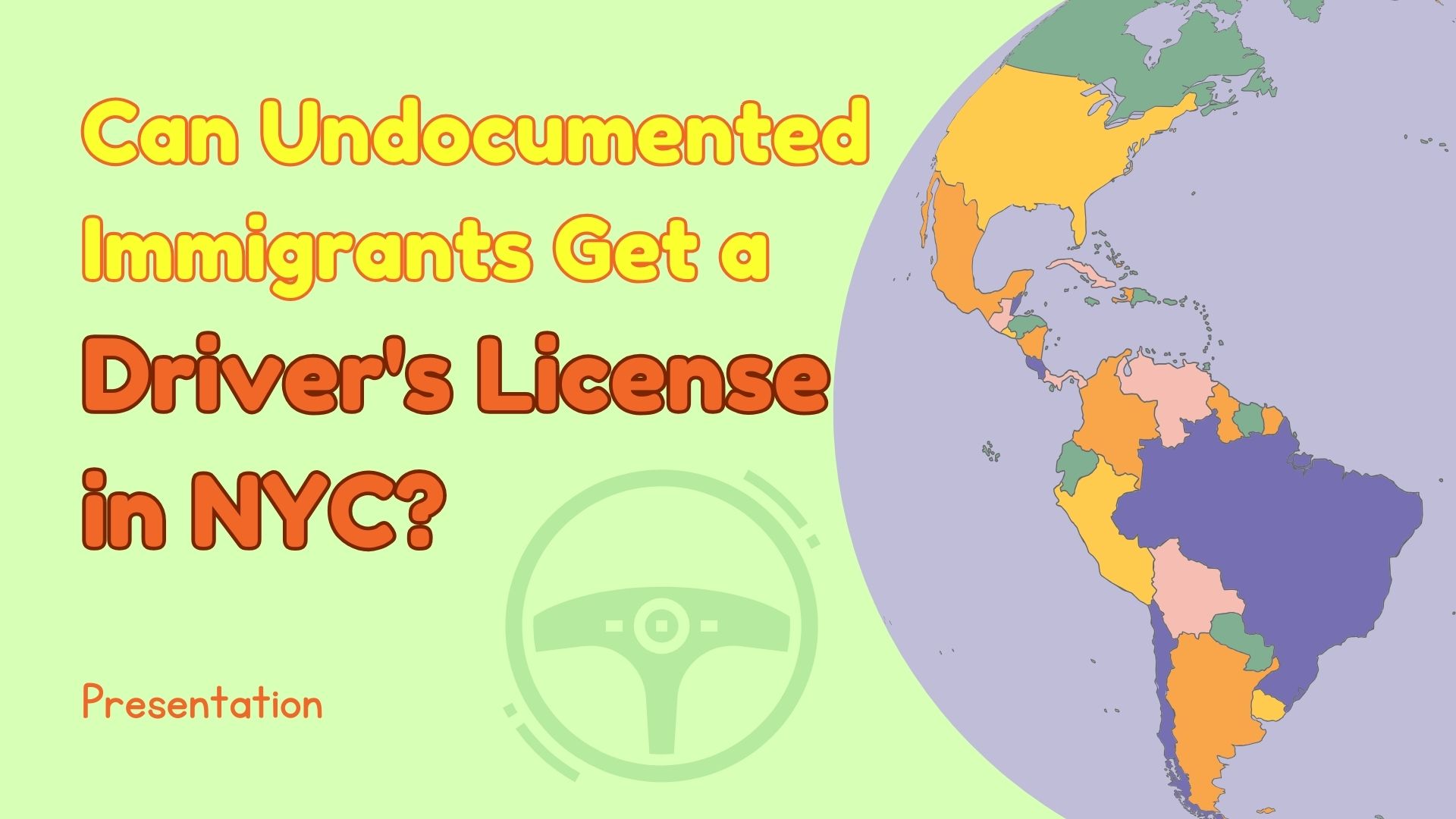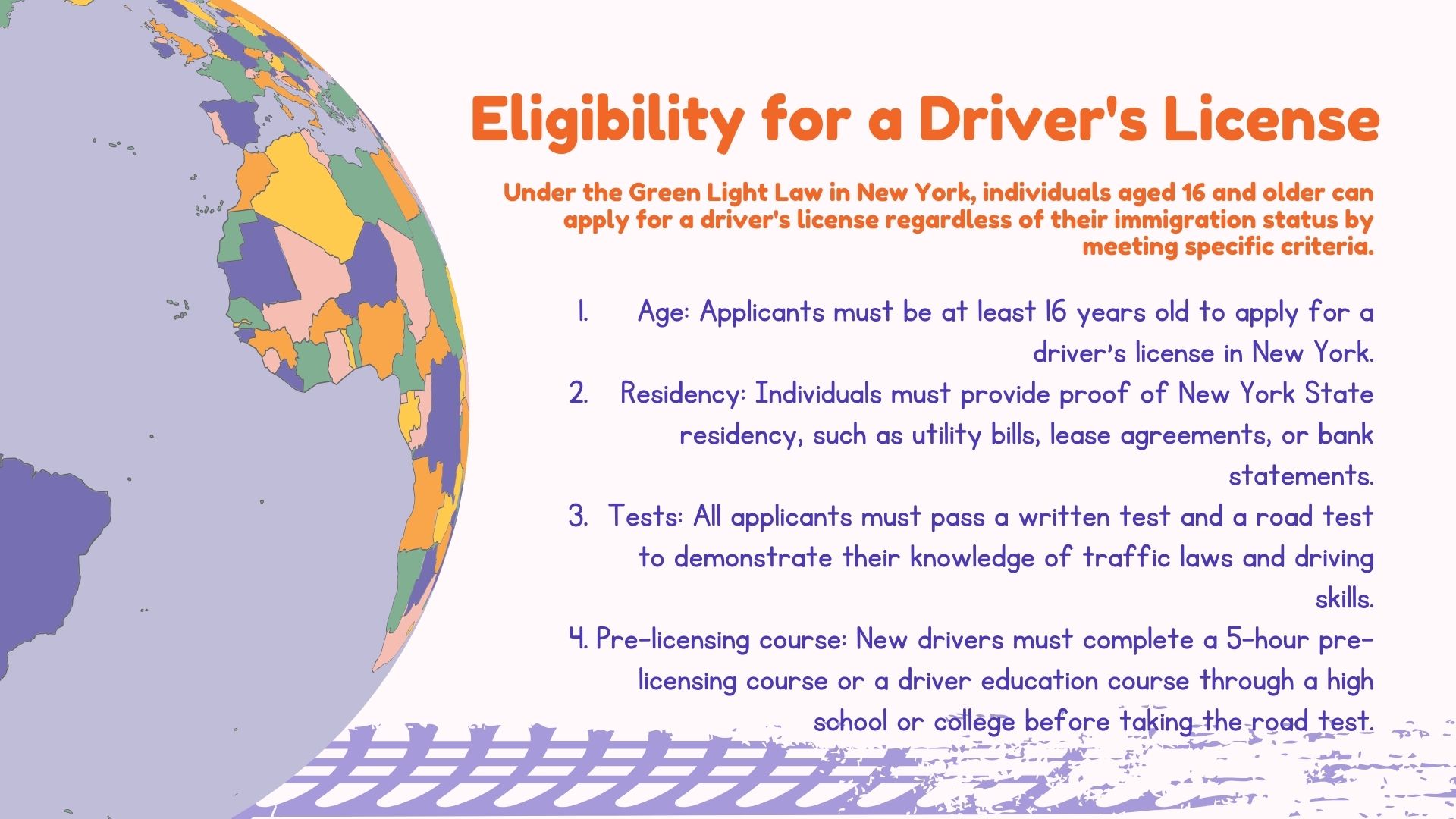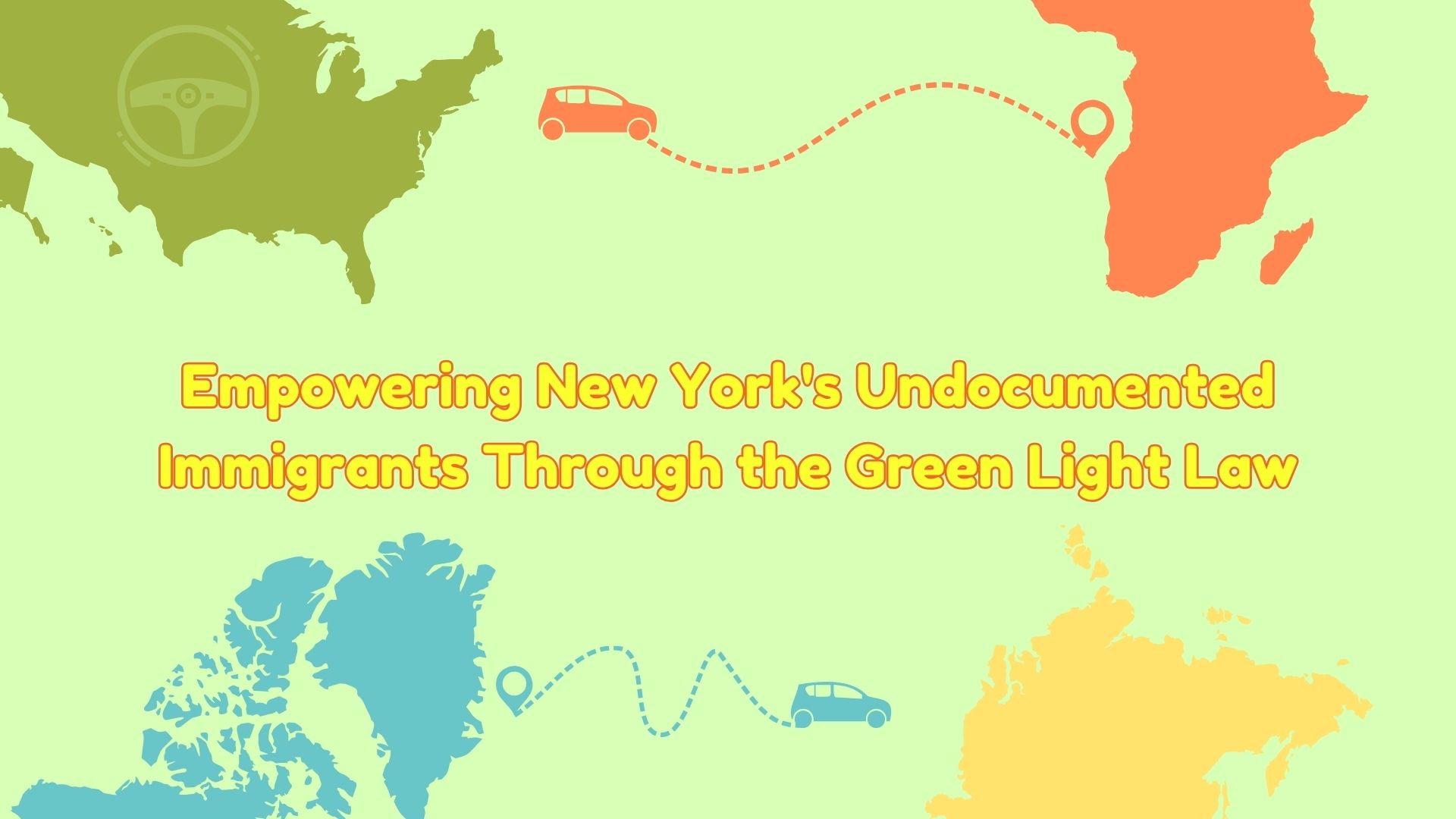Can Undocumented Immigrants Get a Driver's License in NYC?

Table of Contents
For countless undocumented immigrants in New York City, the challenges of daily life are compounded by the inability to obtain a driver's license. Without this essential document, simple tasks like commuting to work, taking children to school, or accessing healthcare become daunting obstacles. However, the introduction of the Green Light Law in 2019 has opened new doors for these individuals, allowing them to apply for a driver's license regardless of their immigration status. In this article, we'll explore how to get a driver's license in New York for immigrants, focusing on the specific provisions of the Green Light Law and its impact on the lives of undocumented New Yorkers.
The Driver's License Access and Privacy Act, commonly known as the Green Light Law, has revolutionized the process of obtaining a driver's license for undocumented immigrants in New York. By removing the requirement to provide proof of legal presence in the United States, the law has made it possible for an estimated 752,000 undocumented New Yorkers to apply for a standard driver's license. This not only improves road safety by ensuring that all drivers are properly licensed and insured but also provides a sense of belonging and increased opportunities for these individuals.
It's important to note that while the Green Light Law has expanded access to driver's licenses, these licenses are labeled "NOT FOR FEDERAL PURPOSES" and cannot be used as identification for boarding domestic flights or entering federal buildings. Despite this limitation, the ability to obtain a driver's license remains a significant step forward for undocumented immigrants in New York City, promoting greater inclusion and empowerment within the community.
What is the Green Light Law?
The Green Light Law, formally known as the Driver's License Access and Privacy Act, was passed by the New York State Legislature in 2019. This groundbreaking legislation allows all New Yorkers aged 16 and above to apply for a standard driver's license, regardless of their immigration status. The law aims to make the roads safer, boost the economy, and provide undocumented immigrants with greater opportunities to participate in their communities.
Key provisions of the Green Light Law include:
- Accessibility: All New Yorkers, including undocumented immigrants, can apply for a standard driver's license, provided they pass the required tests and meet the necessary criteria.
- Privacy protections: The law includes strict privacy measures to safeguard the personal information of license applicants. Federal immigration enforcement agencies cannot access DMV records without a court order or judicial warrant, and state agencies are prohibited from disclosing information to immigration authorities without a subpoena.
- Identification requirements: Applicants who do not have a Social Security Number (SSN) can sign an affidavit attesting that they have not been issued one. The DMV also accepts various foreign documents, such as passports and consular identification cards, as proof of identity.
- Standard licenses: Licenses issued under the Green Light Law are "standard" licenses, marked "NOT FOR FEDERAL PURPOSES" in the top right corner. These licenses cannot be used for federal identification purposes, such as boarding domestic flights or entering certain federal buildings.
The Green Light Law has faced legal challenges from some county clerks and the Trump administration, but courts have consistently upheld its validity. The law's passage marks a significant victory for immigrant rights advocates, as it provides undocumented New Yorkers with a legal means to obtain a driver's license and participate more fully in their communities.
Eligibility for a Driver's License

Under the Green Light Law, all New Yorkers aged 16 and above are eligible to apply for a standard driver's license, regardless of their immigration status. To obtain a license, applicants must meet the following requirements:
- Age: Applicants must be at least 16 years old to apply for a driver's license in New York.
- Residency: Individuals must provide proof of New York State residency, such as utility bills, lease agreements, or bank statements.
- Tests: All applicants must pass a written test and a road test to demonstrate their knowledge of traffic laws and driving skills.
- Pre-licensing course: New drivers must complete a 5-hour pre-licensing course or a driver education course through a high school or college before taking the road test.
One significant change brought about by the Green Light Law is that applicants are no longer required to provide a Social Security Number (SSN) to obtain a driver's license. Instead, those who have never been issued an SSN can sign an affidavit stating this fact.
It's important to note that while the Green Light Law has made it possible for undocumented immigrants to obtain a driver's license, it does not change their immigration status or provide a pathway to citizenship. The standard licenses issued under this law are also not valid for federal identification purposes, such as boarding domestic flights or entering certain federal buildings.
By expanding eligibility for driver's licenses, the Green Light Law has taken a significant step towards promoting greater inclusion and empowerment for all New Yorkers, regardless of their immigration status.
Documents Needed to Apply
To apply for a driver's license under the Green Light Law, applicants must provide various documents to prove their identity and New York State residency. The New York Department of Motor Vehicles (DMV) has implemented a point system to determine the acceptability of these documents.
Proof of Identity
Applicants must provide documents totaling at least 6 points to prove their identity. Some common documents and their point values include:
|
Document |
Points |
|
Valid foreign passport |
4 |
|
Valid consular ID |
4 |
|
Foreign driver's license (valid or expired within 24 months) |
4 |
|
Foreign birth certificate |
4 |
|
Foreign school report card or school record |
1 (2 with photo) |
|
U.S. Municipal ID card with photo (e.g., IDNYC) |
1 |
Proof of New York State Residency
In addition to proof of identity, applicants must provide at least one document demonstrating their residency in New York State. Acceptable documents include:
- Utility bills (e.g., gas, electric, cable)
- Bank statements
- Lease agreements or mortgage statements
- Property tax bills
- Insurance policies
- School records or transcripts
Alternative Options
For individuals who may have limited documentation, there are alternative options available. For example, the DMV accepts foreign documents, such as passports and consular identification cards, as proof of identity. Additionally, the Municipal ID card issued by New York City (IDNYC) can be used to earn 1 point towards the identity requirement and simultaneously serve as proof of residency.
It's essential to ensure that all documents presented are original or certified copies, unexpired, and translated into English by a certified translator if necessary. By gathering the required documents and understanding the point system, applicants can be well-prepared when applying for a driver's license under the Green Light Law.
The Application Process
Applying for a driver's license under the Green Light Law involves several steps, which can be completed either online or in-person at a New York Department of Motor Vehicles (DMV) office. Here's a step-by-step guide to the application process:
Step 1: Gather Required Documents
Before beginning the application process, ensure that you have all the necessary documents to prove your identity and New York State residency, as outlined in the previous section.
Step 2: Complete the Application
You can either download and fill out the application form (Form MV-44) from the DMV website or obtain a copy at your local DMV office. Be sure to complete the form accurately and sign it.
Step 3: Schedule an Appointment or Visit a DMV Office
While some DMV offices accept walk-ins, it's generally recommended to schedule an appointment online to reduce wait times. You can find a list of DMV offices and their available services on the DMV website.
Step 4: Pass the Written Test
All applicants must pass a written test covering traffic laws, road signs, and safe driving practices. The test can be taken at a DMV office or online, and is available in multiple languages. To prepare for the test, study the New York State Driver's Manual, which is available online or at any DMV office.
Step 5: Pay the Application Fee
The fee for a standard driver's license varies based on the applicant's age and the license's validity period. Fees can be paid by credit card, cash, or check at the DMV office.
Step 6: Get a Learner's Permit
After passing the written test and paying the fee, you will be issued a learner's permit. This permit allows you to practice driving under the supervision of a licensed driver who is at least 21 years old.
Step 7: Complete a Pre-Licensing Course and Practice Driving
Before taking the road test, you must complete a 5-hour pre-licensing course or a driver education course through a high school or college. You should also practice driving with a supervised licensed driver for at least 50 hours (15 hours for applicants 18 and older).
Step 8: Schedule and Pass the Road Test
Once you feel confident in your driving abilities, schedule a road test at a DMV office. During the test, you will be evaluated on your driving skills and adherence to traffic laws. If you pass the test, you will be issued a standard driver's license.
Throughout the application process, remember that the DMV is committed to protecting the privacy of all applicants under the Green Light Law. If you have any questions or concerns, don't hesitate to reach out to a DMV representative or consult the resources available on the DMV website.
Additional Considerations
When applying for a driver's license under the Green Light Law, there are a few additional factors to keep in mind:
Car Insurance
While the Green Light Law has made it possible for undocumented immigrants to obtain a driver's license, it's important to remember that all drivers in New York State are required to have car insurance. Driving without insurance can result in significant fines and legal consequences. Be sure to research and compare insurance options to find a policy that meets your needs and budget.
Impact on Immigration Status
It's crucial to understand that obtaining a driver's license under the Green Light Law does not change your immigration status or provide a pathway to citizenship. The standard licenses issued under this law are for driving purposes only and cannot be used as federal identification.
However, the Green Light Law includes strong privacy protections to ensure that applicants' personal information is not shared with federal immigration enforcement agencies without a court order or judicial warrant. This means that applying for a driver's license should not put you at increased risk of deportation or other immigration-related consequences.
Benefits of Having a Driver's License
Despite the limitations of standard licenses issued under the Green Light Law, obtaining a driver's license can still provide numerous benefits for undocumented immigrants in New York City. These include:
- Increased mobility: With a driver's license, you can legally drive to work, school, medical appointments, and other essential destinations without relying on public transportation or risking driving without a license.
- Improved job opportunities: Many jobs require a valid driver's license, particularly in industries such as construction, delivery services, and transportation. Having a license can expand your employment options and potentially lead to higher-paying positions.
- Enhanced safety: By requiring all drivers to be properly licensed and insured, the Green Light Law helps make New York's roads safer for everyone. Additionally, licensed drivers are more likely to report accidents and cooperate with law enforcement, reducing the risk of hit-and-run incidents.
- Greater sense of belonging: Obtaining a driver's license can provide a sense of normalcy and inclusion for undocumented immigrants, allowing them to participate more fully in their communities and feel less marginalized.
While the decision to apply for a driver's license is a personal one, it's important to weigh the potential benefits against any concerns you may have. By staying informed about the Green Light Law and its implications, you can make the best choice for yourself and your family.
Empowering New York's Undocumented Immigrants Through the Green Light Law

The Green Light Law has been a game-changer for undocumented immigrants in New York City, providing them with the opportunity to obtain a driver's license and participate more fully in their communities. By expanding eligibility requirements and implementing strong privacy protections, the law has made it possible for hundreds of thousands of New Yorkers to legally drive, regardless of their immigration status.
While the process of obtaining a license under the Green Light Law may seem daunting at first, the steps are clearly outlined, and resources are available to assist applicants throughout the process. From gathering the necessary documents to passing the written and road tests, the New York Department of Motor Vehicles (DMV) is committed to making the application process as accessible and efficient as possible.
It's important to remember that obtaining a driver's license under the Green Light Law does not change an individual's immigration status or provide a pathway to citizenship. However, it does offer numerous benefits, including increased mobility, improved job opportunities, enhanced safety, and a greater sense of belonging.
For undocumented immigrants in New York City who are considering applying for a driver's license, it's essential to weigh the potential benefits against any concerns they may have. Seeking guidance from immigrant rights organizations and staying informed about the law's provisions can help individuals make the best decision for their unique circumstances.
Ultimately, the Green Light Law represents a significant step forward in promoting greater inclusion, empowerment, and opportunity for all New Yorkers, regardless of their immigration status. By embracing this law and supporting those who stand to benefit from it, we can work together to build a more just, equitable, and welcoming city for all.
Frequently Asked Questions
-
What is the Green Light Law?
The Green Light Law, also known as the Driver's License Access and Privacy Act, is a New York State law that allows all residents, regardless of immigration status, to apply for a standard driver's license.
-
Can undocumented immigrants apply for a driver's license under the Green Light Law?
Yes, the Green Light Law permits undocumented immigrants to apply for a standard driver's license in New York, provided they meet the age, residency, and testing requirements.
-
What documents are needed to apply for a driver's license under the Green Light Law?
Applicants must provide proof of identity and New York State residency. Acceptable documents include foreign passports, consular identification cards, foreign birth certificates, and utility bills or lease agreements. A complete list of acceptable documents and their point values can be found on the New York Department of Motor Vehicles (DMV) website.
-
Is a Social Security Number (SSN) required to apply for a driver's license?
No, under the Green Light Law, applicants who have never been issued an SSN can sign an affidavit stating this fact and still be eligible to apply for a standard driver's license.
-
What type of license will be issued under the Green Light Law?
Licenses issued under the Green Light Law are standard driver's licenses, which are marked "NOT FOR FEDERAL PURPOSES" in the top right corner. These licenses cannot be used for federal identification purposes, such as boarding domestic flights or entering certain federal buildings.
-
Will applying for a driver's license under the Green Light Law affect my immigration status?
No, obtaining a driver's license under the Green Light Law does not change your immigration status or provide a pathway to citizenship. The law includes privacy protections to ensure that applicants' personal information is not shared with federal immigration enforcement agencies without a court order or judicial warrant.
-
What are the benefits of obtaining a driver's license under the Green Light Law?
Having a driver's license can provide numerous benefits, including increased mobility, improved job opportunities, enhanced safety, and a greater sense of belonging and participation in the community.
-
Are there any additional requirements for undocumented immigrants when applying for car insurance?
No, the process of obtaining car insurance is the same for all drivers in New York, regardless of immigration status. Insurers cannot discriminate based on immigration status or ask for additional documentation beyond what is required for all applicants.
-
Can I use a driver's license obtained under the Green Light Law to register to vote?
No, the Green Light Law does not change the eligibility requirements for voter registration. Only U.S. citizens are eligible to register to vote in New York.
-
Where can I find more information about the Green Light Law and the application process?
For more information, visit the New York Department of Motor Vehicles (DMV) website or contact your local DMV office. You can also seek assistance from immigrant rights organizations, which may provide guidance and resources to help you navigate the application process.

 WhatsApp
WhatsApp
